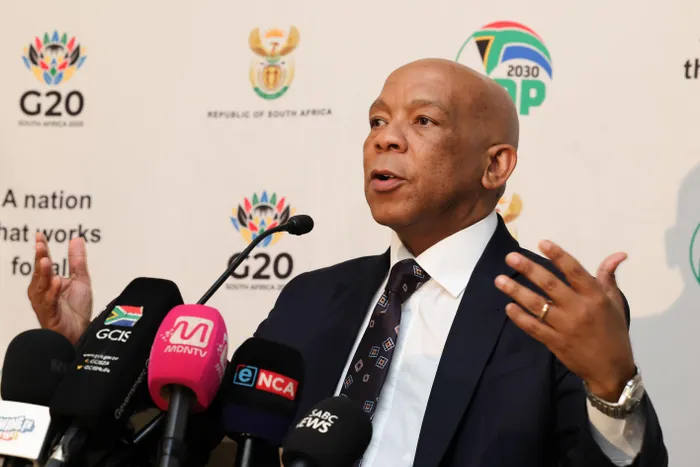Ramokgopa shifts focus to electricity costs after load reduction push

Dr. Kgosientsho Ramokgopa, Minister of Electricity and Energy, held a media briefing in Pretoria on Thursday to announce interventions aimed at ending load reduction.
Image: Supplied/GCIS
Minister for Electricity and Energy, Kgosientsho Ramokgopa, has said with load reduction firmly on focus, the cost of electricity was the next priority in the electricity deficit.
Beyond load reduction, the minister has committed to addressing electricity costs through a comprehensive review of pricing policies.
Speaking on Thursday on the interventions the government was making to end load reduction by March 2027, Ramokgopa said the department was working on the resolution on the cost of electricity, which from 2007 to 2024, has increased by 937% compared to inflation of 155%.
He said the cost of electricity was eroding the income of many households across all income levels, leaving them finding it exceptionally difficult to afford the cost of electricity.
"We are very methodical, very judicious, very calculated in the manner in which we are doing these things. We can't do everything at a go. We started with load shedding. We are now on load reduction. We will come to the cost of electricity," Ramokgopa said.
"I accept that it's urgent that we resolve it. I accept that we have to open up the process for the many bright ideas that are there and we need to give them sufficient time to engage. So we will open that by the first quarter of next year. We'll be able to come back and address this situation."
He said the roll out of smart meters was expected to be funded from Eskom's balance sheet and the Integrated National Electricification Programme (INEP).
"We have gone to Cabinet to rethink the INEP, which is meant for universal access. We get an allocation of R4 billion a year, so we will take part of that and redirect it to support Eskom in this effort of rolling out smart meters," he said.
"What is the cost of not doing this? The municipal debt to Eskom, presently at about R100 billion and growing by about R2bn a year, will spiral, and I have said to the Eskom board that it presents an existential problem."
Ramokgopa said the development of the Distribution Agency Agreement (DAA), to help position municipalities in the electricity provision chain, was at an advanced stage, having been approved by Eskom.
"As part of the totality of those interventions in the municipal provided areas, we will make this intervention and the proceeds that come from the revenues collected will go extinguish what will be upfront capital cost that Eskom will have incurred as a result of stabilising the grid and rolling the smart metres," Ramokgopa said.
Load reduction refers to the intentional interruption of electricity in specific areas where the local network becomes overloaded, especially during peak demand periods. This measure is essential to safeguard critical infrastructure, particularly in areas affected by high energy losses or illegal connections that place excessive strain on the isolated networks.
According to the minister, Gauteng, Limpopo, Mpumalanga and KwaZulu-Natal account for nearly 80% of national load reduction.
In Gauteng alone, 632 158 customers are affected, supported by 604 overloaded feeders. The department aims to resolve 145 of those feeders by March 2026, potentially more, depending on local support, he said.
Ramokgopa said the strategy to end load reduction included three key interventions: a national roll out of smart meters, refurbishment and upgrade of local infrastructure, and the deployment of decentralised electricity generation through solar-powered microgrids.
"Depending on the level of resistance, we will have eliminated load reduction across the length and breadth of the country by March 2027. But our view is that we are confident we can do it much much earlier. It's a function of community cooperation, and of course we invest a lot of resources in that engagement," he said.
BUSINESS REPORT